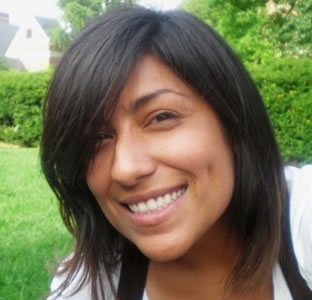UTSA prepares Zoya Farzampour '10 for Stanford graduate program in neuroscience

Zoya Farzampour

Zoya Farzampour
(May 26, 2010)--Zoya Farzampour '10 is not your typical college graduate. In her junior year of high school, she lived with her father. In her senior year, her father left her to take care of his own dying father. As a high school graduate, she began living day-to-day.
"I wanted to do something besides just survive," said Farzampour. "I wanted it to be positive. I had always enjoyed school, especially my math and science classes. I knew education was my ticket out of the life I was living, so I called the closest community college and asked them how to attend."
That was Northwest Vista College in San Antonio. And, before long, she was enrolled in pre-med classes and receiving financial aid.
As a college student, Farzampour was eager to experience life as a doctor. To get a better sense of the profession, she volunteered at a local hospital, and the experience was eye opening.
"I felt very helpless at times," she said. "I learned that the treatments are often as bad as the ailments themselves. Sometimes a pill does as much damage as the ailment, then the patient has to take another pill."
That stint as a hospital volunteer made Farzampour re-think a career in clinical medicine. She turned her focus to biomedical research but was hesitant to join a laboratory, fearing it would be an isolating experience for an outgoing person like herself.
Fortunately, she met Gail Taylor, assistant director of the UTSA RISE (Research Initiative for Scientific Enhancement) and MARC-U*STAR (Minority Access to Research Careers - Undergraduate Student Training for Academic Research) programs.
The RISE program supports research by faculty members, strengthening the institutions' biomedical research capabilities and providing opportunities for students to work as part of a research team. The MARC-U*STAR program, which Farzampour joined, offers training, financial support and networking opportunities to undergraduates who want to continue their studies in competitive graduate programs in the biomedical sciences.
Through Taylor, Farzampour met David Jaffe, UTSA professor of neurobiology, who offered her a spot in his laboratory. Jaffe's laboratory studies how changes in the brain's hippocampus affect learning and memory, a challenge that intrigued Farzampour.
"The more I got into it, the more I loved it in the lab," she said. "I loved the creative process -- the cutting-edge science. I also met a lot of really good people -- smart and ethical people who enjoy what they do and have a passion for it."
In her senior year, Farzampour was accepted into some of the nation's most competitive graduate programs in neuroscience including Berkeley, Yale, Wisconsin at Madison, UT Austin and USC.
This month, as she graduated with her UTSA bachelor's degree in biology with honors, she was comforted by the simple fact that, through education, she changed the course of her life. And, now that the party is over, she is packed and headed for a graduate program in neuroscience at Stanford.
Events
The UTSA Office of Undergraduate is proud to celebrate National Undergraduate Research with an annual event sponsored by the (OUR) featuring students will showcase undergraduate student research and creative endeavors from all disciplines across campus.
Various LocationsDía en la Sombrilla, formerly Fiesta UTSA, is a festival hosted each spring as a part of Fiesta® San Antonio events. Sponsored by Roadrunner Productions, the event features music, food, confetti, games, event t-shirts, and more.
Sombrilla Plaza and Central Plaza, Main CampusFiesta Arts Fair features contemporary art from more than 100 artists from across the U.S., Fiesta favorite foods, drinks, live music by local and regional performers, and a Young Artists Garden providing opportunities for budding artists to learn, explore and express their creativity.
UTSA Southwest CampusJoin the PEACE Center and Wellbeing Services for Denim Day, a day of learning about the importance of consent and why we wear denim on the last Wednesday of the month each April during Sexual Assault Awareness Month. Stop by our Denim Day display to take a photo in front of our Denim Wall, spin the "Is It Consent?" Wheel, and get a Concha or goodie.
Student Union Window Lounge, Main CampusLearn to use Zotero®, a citation manager that can help you store and organize citations you find during your research. Zotero can generate bibliographies in various styles, insert in-text citations and allow you to share sources with collaborators.
Virtual EventCelebrate the accomplishments of College of Education and Human Development, College for Health, Community and Policy, College of Sciences and University College.
AlamodomeCelebrate the accomplishments of Alvarez College of Business, College of Liberal and Fine Arts and Klesse College of Engineering and Integrated Design.
Alamodome

